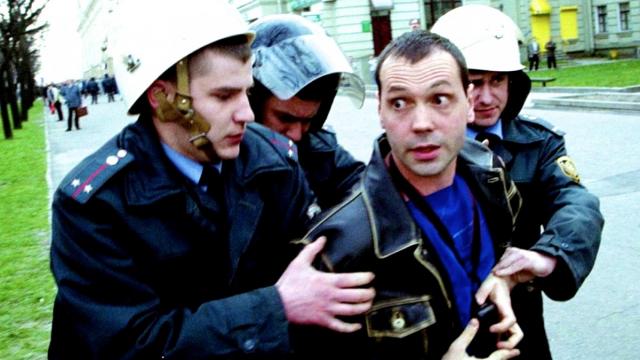
Strumming his guitar in a forest clearing in Poland, Belarusian rocker Lavon Volski sings into the microphone: “Break everything, break the system.”
As he criticizes the authoritarian regime of Belarusian president Alexander Lukashenko, the crowd chants “Long live Belarus,” waving the white and red flag of the opposition.
Banned from giving concerts in his homeland, Volski and fellow musicians crossed over into neighboring Poland last weekend to play at the annual Basowiszcza festival, held in the border town of Gródek.
“I can’t sing in Belarus because my lyrics are too strong. The regime doesn’t like these kinds of songs,” said the 49-year-old Volski.
Thousands of young Belarusians have descended upon the festival for years, to see their favorite underground bands play free from the fear of arrest.
"A Window onto a Free Belarus"
Since Lukashenko came to power in 1994, his government has routinely faced international criticism over its human rights record.
In 2010, tens of thousands of people protested against what they said were unfair presidential elections that gave Lukashenko another landslide victory. Following the protests, the strongman unleashed a crackdown on the opposition, imprisoning some of his most prominent critics and muzzling independent media.
Lukashenko is running for re-election in October, but festival goers voiced widespread pessimism regarding the possibility of a regime change.
“There’s no way you could hold this kind of festival in Belarus. Here the rock bands say what they can’t over there,” said Ruslan, a 24-year-old Belarusian living in Poland who declined to provide a second name for fear of compromising the safety of his family back home.
Dressed in a black t-shirt, he came out to hear punk-rocker Brutto frontman Siarhei Mikhalok, whose song Don’t Be Cattle has become something of an anthem for the opposition movement.
“If I wore this shirt out on the streets of Belarus, I’d have a 95% chance of getting arrested,” Ruslan said.
The festival dates back to 1990, just after the fall of communism in Poland, when students from the Belarusian minority in the eastern town of Podlasie racked their brains for a way to attract young people to a place where politics could be openly discussed.
Poland had not yet then joined Europe’s visa-free Schengen zone, so Belarusians were free to come and go. Now, visitors need to obtain a visa for £40.
Most of the performers are from Belarus – including many who steer clear of politics and are allowed to perform at home – but there were also two from Poland’s Belarusian minority, and two other Polish bands.
Whereas in the early days the crowd numbered no more than 100, this year the audience was 4,000 strong.
“Here we breathe the air of freedom for three days,” said Nikolai Lemianouski, a 49-year-old Belarusian and festival regular from the western city of Grodno.
“This festival is like a window onto a free Belarus.”
3 WAYS TO SHOW YOUR SUPPORT
- Log in to post comments













